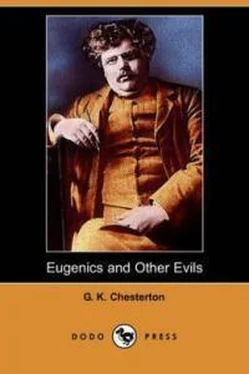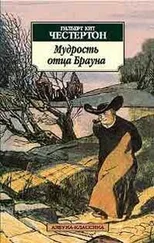Charity will begin at home in the sense that all home children will be like charity children. Philanthropy will begin at home, for all householders will be like paupers. Police administration will begin at home, for all citizens will be like convicts. And when health and the humours of daily life have passed into the domain of this social discipline, when it is admitted that the community must primarily control the primary habits, when all law begins, so to speak, next to the skin or nearest the vitals—then indeed it will appear absurd that marriage and maternity should not be similarly ordered. Then indeed it will seem to be illogical, and it will be illogical, that love should be free when life has lost its freedom.
So passed, to all appearance, from the minds of men the strange dream and fantasy called freedom. Whatever be the future of these evolutionary experiments and their effect on civilisation, there is one land at least that has something to mourn. For us in England something will have perished which our fathers valued all the more because they hardly troubled to name it; and whatever be the stars of a more universal destiny, the great star of our night has set. The English had missed many other things that men of the same origins had achieved or retained. Not to them was given, like the French, to establish eternal communes and clear codes of equality; not to them, like the South Germans, to keep the popular culture of their songs; not to them, like the Irish, was it given to die daily for a great religion. But a spirit had been with them from the first which fenced, with a hundred quaint customs and legal fictions, the way of a man who wished to walk nameless and alone. It was not for nothing that they forgot all their laws to remember the name of an outlaw, and filled the green heart of England with the figure of Robin Hood. It was not for nothing that even their princes of art and letters had about them something of kings incognito, undiscovered by formal or academic fame; so that no eye can follow the young Shakespeare as he came up the green lanes from Stratford, or the young Dickens when he first lost himself among the lights of London. It is not for nothing that the very roads are crooked and capricious, so that a man looking down on a map like a snaky labyrinth, could tell that he was looking on the home of a wandering people. A spirit at once wild and familiar rested upon its wood–lands like a wind at rest. If that spirit be indeed departed, it matters little that it has been driven out by perversions it had itself permitted, by monsters it had idly let loose. Industrialism and Capitalism and the rage for physical science were English experiments in the sense that the English lent themselves to their encouragement; but there was something else behind them and within them that was not they—its name was liberty, and it was our life. It may be that this delicate and tenacious spirit has at last evaporated. If so, it matters little what becomes of the external experiments of our nation in later time. That at which we look will be a dead thing alive with its own parasites. The English will have destroyed England.
Chapter VII
The Transformation of Socialism
Socialism is one of the simplest ideas in the world. It has always puzzled me how there came to be so much bewilderment and misunderstanding and miserable mutual slander about it. At one time I agreed with Socialism, because it was simple. Now I disagree with Socialism, because it is too simple. Yet most of its opponents still seem to treat it, not merely as an iniquity but as a mystery of iniquity, which seems to mystify them even more than it maddens them. It may not seem strange that its antagonists should be puzzled about what it is. It may appear more curious and interesting that its admirers are equally puzzled. Its foes used to denounce Socialism as Anarchy, which is its opposite. Its friends seemed to suppose that it is a sort of optimism, which is almost as much of an opposite. Friends and foes alike talked as if it involved a sort of faith in ideal human nature; why I could never imagine. The Socialist system, in a more special sense than any other, is founded not on optimism but on original sin. It proposes that the State, as the conscience of the community, should possess all primary forms of property; and that obviously on the ground that men cannot be trusted to own or barter or combine or compete without injury to themselves. Just as a State might own all the guns lest people should shoot each other, so this State would own all the gold and land lest they should cheat or rackrent or exploit each other. It seems extraordinarily simple and even obvious; and so it is. It is too obvious to be true. But while it is obvious, it seems almost incredible that anybody ever thought it optimistic.
I am myself primarily opposed to Socialism, or Collectivism or Bolshevism or whatever we call it, for a primary reason not immediately involved here: the ideal of property. I say the ideal and not merely the idea; and this alone disposes of the moral mistake in the matter. It disposes of all the dreary doubts of the Anti–Socialists about men not yet being angels, and all the yet drearier hopes of the Socialists about men soon being supermen. I do not admit that private property is a concession to baseness and selfishness; I think it is a point of honour. I think it is the most truly popular of all points of honour. But this, though it has everything to do with my plea for a domestic dignity, has nothing to do with this passing summary of the situation of Socialism. I only remark in passing that it is vain for the more vulgar sort of Capitalist, sneering at ideals, to say to me that in order to have Socialism "You must alter human nature." I answer "Yes. You must alter it for the worse."
The clouds were considerably cleared away from the meaning of Socialism by the Fabians of the 'nineties; by Mr. Bernard Shaw, a sort of anti–romantic Quixote, who charged chivalry as chivalry charged windmills, with Sidney Webb for his Sancho Panza. In so far as these paladins had a castle to defend, we may say that their castle was the Post Office. The red pillar–box was the immovable post against which the irresistible force of Capitalist individualism was arrested. Business men who said that nothing could be managed by the State were forced to admit that they trusted all their business letters and business telegrams to the State.
After all, it was not found necessary to have an office competing with another office, trying to send out pinker postage–stamps or more picturesque postmen. It was not necessary to efficiency that the postmistress should buy a penny stamp for a halfpenny and sell it for twopence; or that she should haggle and beat customers down about the price of a postal order; or that she should always take tenders for telegrams. There was obviously nothing actually impossible about the State management of national needs; and the Post Office was at least tolerably managed. Though it was not always a model employer, by any means, it might be made so by similar methods. It was not impossible that equitable pay, and even equal pay, could be given to the Postmaster–General and the postman. We had only to extend this rule of public responsibility, and we should escape from all the terror of insecurity and torture of compassion, which hag–rides humanity in the insane extremes of economic inequality and injustice. As Mr. Shaw put it, "A man must save Society's honour before he can save his own."
That was one side of the argument: that the change would remove inequality; and there was an answer on the other side. It can be stated most truly by putting another model institution and edifice side by side with the Post Office. It is even more of an ideal republic, or commonwealth without competition or private profit. It supplies its citizens not only with the stamps but with clothes and food and lodging, and all they require. It observes considerable level of equality in these things; notably in the clothes. It not only supervises the letters but all the other human communications; notably the sort of evil communications that corrupt good manners. This twin model to the Post Office is called the Prison. And much of the scheme for a model State was regarded by its opponents as a scheme for a model prison; good because it fed men equally, but less acceptable since it imprisoned them equally.
Читать дальше








